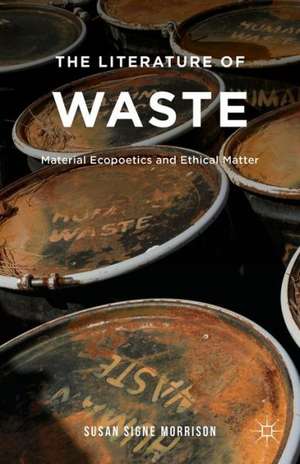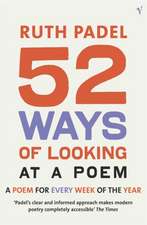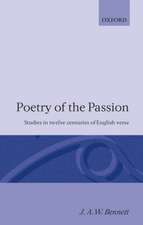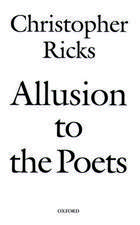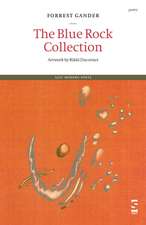The Literature of Waste: Material Ecopoetics and Ethical Matter
Autor S. Morrisonen Limba Engleză Hardback – 4 iun 2015
Preț: 898.91 lei
Preț vechi: 1096.22 lei
-18% Nou
Puncte Express: 1348
Preț estimativ în valută:
172.02€ • 180.88$ • 142.13£
172.02€ • 180.88$ • 142.13£
Carte tipărită la comandă
Livrare economică 16-30 aprilie
Preluare comenzi: 021 569.72.76
Specificații
ISBN-13: 9781137405661
ISBN-10: 113740566X
Pagini: 330
Ilustrații: XIII, 330 p.
Dimensiuni: 140 x 216 x 21 mm
Greutate: 5.37 kg
Ediția:2015
Editura: Palgrave Macmillan US
Colecția Palgrave Macmillan
Locul publicării:New York, United States
ISBN-10: 113740566X
Pagini: 330
Ilustrații: XIII, 330 p.
Dimensiuni: 140 x 216 x 21 mm
Greutate: 5.37 kg
Ediția:2015
Editura: Palgrave Macmillan US
Colecția Palgrave Macmillan
Locul publicării:New York, United States
Cuprins
Introduction: The Waste-ern Literary Canon in the Waste-ern Tradition PART I: TREATMENT AND DISPOSAL: APPROACHES TO DISCIPLINING WASTE 1. Codification: The Anxiety of Ambiguity 2. The Fragmented and Corruptible Body: Gendered Waste 3. The Civilizing Process: Divisive Divisions 4. Memory and Narrative: Ruins, Nostalgia, and Ghosts 5. Failed Source Reduction: Conspicuous Consumption and the Inability to Minimize 6. Urban Myths: The Civilized and Pristine City-Body 7. Interiorized Waste: Sin and Metaphysical Meaninglessness 8. The Toxic Metaphor of Wasted Humans: Those Filthy Cleaners Who Scrub Us Spotless PART II: ENERGY RECOVERY AND THE DYNAMIC POWER OF THINGS 9. The Secret Life of Objects: The Audacity of Thingness and the Poignancy of Materiality 10. Trash Meditation: The Arts of Transience and Proximity PART III: RECYCLING AND COMPOSTING: FORM AS RESTITUTION 11. Waste Aesthetics: Puns, Litter-ature, and Intertextuality 12. Gleaning Aesthetics: Poetry as Communal Salvage PART IV: SOURCE REDUCTION AND REUSE: COMPASSION THROUGH GENEROUS METAPHOR 13. Compost Aesthetics: The Poet[h]ics of Metaphor 14. Poetry as Homeopathy: The Poet as Ragpicker
Recenzii
"An unparalleled work of literary and cultural criticism, The Literature of Waste brings together the new materialism, ecocriticism and environmental ethics to articulate the transformative and trans-temporal project of waste studies. Wide ranging, lucidly composed, and original, the book inspires and provokes. With its emphasis on aesthetics, ethics, literature, and community, The Literature of Waste makes a strong argument for why the humanities matter - and why the matter the humanities explores must also include waste." - Jeffrey Jerome Cohen, Professor of English, George Washington University, USA
"'These fragments I have shored against my ruins,' writes T.S. Eliot famously in The Waste Land. This phrase beautifully describes both the mélange of cultural residue that constitutes modern civilization and the concatenation of disparate sources that informs Morrison's lively, profound, and encyclopedic The Literature of Waste. This is a book that builds wisely upon recent materialist trends in ecocriticism and helps to chart the future of the discipline. I have a new appreciation for the meaning of waste after reading this work." - Scott Slovic, Professor of English, University of Idaho, USA and coeditor of Numbers and Nerves: Information, Emotion, and Meaning in a World of Data
"Building on her seminal work exploring Chaucerian fecopoetics, Excrement in the Late Middle Ages, Morrison extends her brave march into the deepest and dirtiest corners of history's societal relationship with waste. From exploration of conspicuous consumption as a 'means to repute for a gentleman' to the metaphors of sin implied in uncleanliness, Morrison shows that all that litter is indeed - not gold. Having spent a year thinking about waste from my home inside a trash dumpster, I'm intimately in touch with the space that material waste occupies. If only I'd had this book to ponder whilst in the can, I might have found my nights less wasted by fear of impending doom from trash trucks and more filled with beautifully fragrant prose of meaning. You will be enlightened and delighted by this book." - Jeff Wilson, Dean and Associate Professor of Biological Sciences and Professor Dumpster of The Dumpster Project, Huston-Tillotson University, USA
"In a novel act of textual recuperation, The Literature of Waste admirably confronts one of the most perplexing facts of human existence - our discomfiting entanglement in waste - and opens it up to new and transformative possibilities. The thing about waste, Morrison reveals, is that it can become a most vital ally in confronting the ethical dilemmas ahead as we attempt to meet the demands of living now in more sustainable ways." John Scanlan, Senior Lecturer of Sociology, Manchester Metropolitan University, UK and author of On Garbage
"Susan Signe Morrison is a pioneer of 'fecocriticism,' a brave and original mode of literary scholarship. She draws upon anthropology, archaeology, ecology, psychology, and history in order to argue for the centrality of waste in our lived experience and its consequent immanence in literary artefacts from Beowulf to The Great Gatsby. She brilliantly shows how the concerns raised by waste operate in ubiquitous ways across various spheres of human experience. But the greatest achievement of The Literature of Waste is its commitment to the ethics of cultural criticism. Forceful and refreshing, Morrison's work is, ultimately, profoundly moral." - Peter J. Smith, Reader of Renaissance Literature, Nottingham Trent University, UK and author of Between Two Stools: Scatology and its Representations in English Literature, Chaucer to Swift
"'These fragments I have shored against my ruins,' writes T.S. Eliot famously in The Waste Land. This phrase beautifully describes both the mélange of cultural residue that constitutes modern civilization and the concatenation of disparate sources that informs Morrison's lively, profound, and encyclopedic The Literature of Waste. This is a book that builds wisely upon recent materialist trends in ecocriticism and helps to chart the future of the discipline. I have a new appreciation for the meaning of waste after reading this work." - Scott Slovic, Professor of English, University of Idaho, USA and coeditor of Numbers and Nerves: Information, Emotion, and Meaning in a World of Data
"Building on her seminal work exploring Chaucerian fecopoetics, Excrement in the Late Middle Ages, Morrison extends her brave march into the deepest and dirtiest corners of history's societal relationship with waste. From exploration of conspicuous consumption as a 'means to repute for a gentleman' to the metaphors of sin implied in uncleanliness, Morrison shows that all that litter is indeed - not gold. Having spent a year thinking about waste from my home inside a trash dumpster, I'm intimately in touch with the space that material waste occupies. If only I'd had this book to ponder whilst in the can, I might have found my nights less wasted by fear of impending doom from trash trucks and more filled with beautifully fragrant prose of meaning. You will be enlightened and delighted by this book." - Jeff Wilson, Dean and Associate Professor of Biological Sciences and Professor Dumpster of The Dumpster Project, Huston-Tillotson University, USA
"In a novel act of textual recuperation, The Literature of Waste admirably confronts one of the most perplexing facts of human existence - our discomfiting entanglement in waste - and opens it up to new and transformative possibilities. The thing about waste, Morrison reveals, is that it can become a most vital ally in confronting the ethical dilemmas ahead as we attempt to meet the demands of living now in more sustainable ways." John Scanlan, Senior Lecturer of Sociology, Manchester Metropolitan University, UK and author of On Garbage
"Susan Signe Morrison is a pioneer of 'fecocriticism,' a brave and original mode of literary scholarship. She draws upon anthropology, archaeology, ecology, psychology, and history in order to argue for the centrality of waste in our lived experience and its consequent immanence in literary artefacts from Beowulf to The Great Gatsby. She brilliantly shows how the concerns raised by waste operate in ubiquitous ways across various spheres of human experience. But the greatest achievement of The Literature of Waste is its commitment to the ethics of cultural criticism. Forceful and refreshing, Morrison's work is, ultimately, profoundly moral." - Peter J. Smith, Reader of Renaissance Literature, Nottingham Trent University, UK and author of Between Two Stools: Scatology and its Representations in English Literature, Chaucer to Swift
Notă biografică
Susan Signe Morrison is Professor of English at Texas State University, USA.
